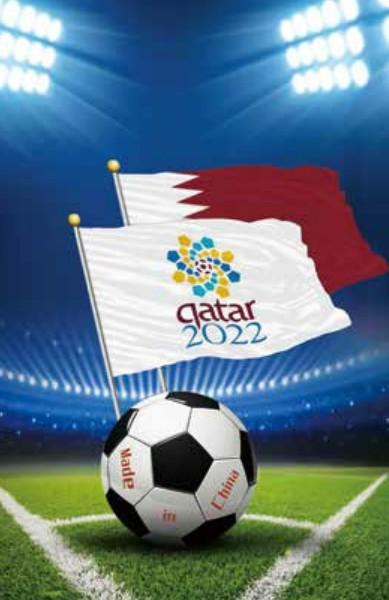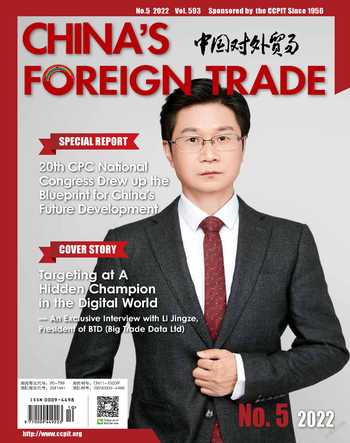China Manufacture“Prepares”for World Cup
By Lily Wang

There is a month to go before the FIFA World Cup Qatar 2022 kicks off, but for Chinese merchants thousands of miles away, this commercial war is almost coming to an end.
At present, in Qatar, the host country of the FIFA World Cup, relevant commodities from Yiwu have been “kicked” into shops both inside and outside the stadium. According to the estimation of Yiwu Sporting Goods Association, from the top 32 national flags, cheering trumpets and whistles, footballs, jerseys and scarves, to FIFA World Cup ornaments and pillows, Yiwu manufacturing accounts for almost 70% of the market share of goods associated with the FIFA World Cup.
Finish orders at full speed ahead
Products associated with the FIFA World Cup are just the tip of the iceberg of the Yiwu commodity market. Covering 43 industries, 1,900 categories and 1.7 million types of commodities, the Yiwu commodity market has long been referred to as “the largest commodity wholesale market in the world” by authorities such as the United Nations, the World Bank and Morgan Stanley.
In previous years, the shipment cycle of the FIFA World Cup was about one year. This year, due to the effects of the pandemic in August, the delivery time requirements were more intense. Many business owners were constantly recruiting to increase their productivity and strive to deliver their products to all parts of the world before the start of the competition.
The sporting goods block in the third district of Chinas Yiwu International Trade City is completely focused on the FIFA World Cup. Various colored scarves, hats, flags, pendants, soccer balls, jerseys and other sporting goods associated with the FIFA World Cup have been placed in the “center position” of shops by market merchants, which is space which is in short supply. In fact, as early as a few months ago, many market operators were thinking about how to make the most of the popularity of the FIFA World Cup and sell related sporting goods all over the world.
“Orders came in October, which was the off-season in previous years, but has been the peak season this year. These are the effects of the World Cup.” Chen Shaomei, a merchant who has been engaged in the football business for 17 years, told reporters that it is estimated that more than 900,000 footballs will be sold this year, a number which is 200,000 more than last year. “All the machines are engaged in making football orders at full speed ahead,” said Chen Shaomei. This year, an anti-counterfeiting mark was added to the surface of the football ball to prevent it from being counterfeited. When explaining the situation to reporters, he said that because the company paid attention to the protection of intellectual property rights, they registered the “MINSA”trademark very early, and these products have already gained a certain amount of popularity on the global market.
How to ship products to destinations around the world before the start of the FIFA World Cup has also become a top priority for merchants.
Shi Mengting, a flag merchant from Bolis Flag on the second floor of the third district of Chinas Yiwu International Trade City, told reporter that she has been in the flag business for more than 20 years. At present, more than one million flags have been exported to Qatar by sea, and many subsequent orders are being manufactured.
“In the first half of the year, we exported more than 400,000 hand flags for the top 32 competition countries to Qatar. There are also flag orders from France, Brazil, Argentina and other countries, which are still being consigned,” said He Jinqi, a market operator, expressing his opinion that this wave of market interest will last until after the FIFA World Cup Top 16, Top 8 and Top 4 are announced. They will arrange later replenishment production processed according to the promotion of each team and ship it abroad as quickly as possible.
Besides footballs, fan supporting products such as flags, cheering sticks and trumpets for the FIFA World Cup are the other main products exported from Yiwu. July and August are the traditional off-season for the sporting goods industry, but due to the numerous orders made for goods for the FIFA World Cup, the business owners of Chinas Yiwu International Trade City have already entered their busiest season of the year.
Every FIFA World Cup can almost “detonate” Yiwu market, and there are many kinds of products going out here, which can almost account for more than half of the whole FIFA World Cup market. Ge Rongxia, a business owner of Chinas Yiwu International Trade City, said that his current orders are mainly from American customers. The next order will be shipped according to the competition results. Although they are not fans, they will always pay attention to related events.
On September 16, Cainiao Network opened the FIFA World Cup shipping line in Yiwu, so that merchants in Chinas Yiwu International Trade City can deliver goods to fans in Qatar and around the world before the FIFA World Cup starts. Through this shipping route, Yiwu products depart from Ningbo Port and Shanghai Port, and can reach Hamad Port in Qatar in 20 days at the quickest. In addition, Cainiao Network also offers different combinations of aircraft routes to cover other parts of the Middle East.
“We have integrated the transportation resources in a short period of time, and have booked a green channel through which Yiwu merchants can open their cabins. As long as they book 10 days in advance, they can keep their cabins and cabinets, and there is no risk of them being dumped. At the same time, FIFA World Cup-related goods can also enjoy exclusive special offers to reduce logistics costs for small and medium-sized businesses in Yiwu,”Pei Hu, the relevant person in charge of the Cainiao Network international trunk line, expressed the hope that through the global logistics service, Yiwu products can reach their destinations around the world faster and faster.
From “Made in China” to“Chinese Brands”
For a long time, whether its authorized mascot production, peripheral goods manufacturing, or sponsor lineups, in all previous FIFA World Cups, regardless of the performance of Chinas football team, Chinese merchants have always undeniably won.
Yiwu thinks about how to incite the market more deeply all the time, constantly creating more and more popular products. From the “vuvuzela”that unexpectedly became popular during the 2010 FIFA World Cup in South Africa to the “little yellow duck hairpins”like the one worn by Yang Qian during the Tokyo 2020 Olympic Games, in recent years, Yiwu commodities are normally surprising items.
However, Chinese merchants are still pursuing the deeper transformation from “product” to“brand”, which also means a broader prospect of “money” for almost all manufactured goods, including sports and cultural products, in the future.
At present, one type of FIFA World Cup products made in China is authorized commodities, such as mascots and mascot-related products involving the FIFA World Cup logo and other components. Another type of FIFA World Cup products is unauthorized goods, such as flags, horns and other products produced in Yiwu, which do not involve copyright issues.
Li Hong, CEO of Kayford Branding Co., Ltd, said that licensing is a special business model between OEMs and brands. Generally speaking, this model involves borrowing and using the name of the brand.
In Li Hongs view, Chinese enterprises should first learn brand awareness by obtaining authorization, then slowly establish their own brands, and then go out with Chinese brands and occupy other countries markets.
In the future, it will only be possible to create one sports peripheral product after another with an active market by changing from OEM products to branding.
While building a brand, it is imperative to practice internal strength and constantly innovate and change. In fact, Yiwu and other small commodities from China fighting through in the FIFA World Cup and working on the international market are the embodiment of the accelerated transformation and upgrading of Chinese manufacturing. The core strength of the rise of commodities related to the FIFA World Cup comes from enterprise brands, designers, scientists and technicians, the manufacturing industry and Internet platforms. It can be said that sports cultural products represent the epitome of the deep collision between Chinas manufacturing and design creativity.
In Li Hongs view, “sports extended goods and peripheral goods are types of cultural goods. At present, the consumption of these goods in China is undergoing a process of cultivation, competition and promotion, and still occupies a relatively small scale compared with that of the United States. For example, there are currently so many fans of Beijing Guoan F.C., but the fans who buy extended products may account for less than 10%. If this could account for 30% in the future, our sales will double. There is a lot of room for growth in the future. With the development of the Chinese market and consumption, sports and cultural consumer goods will continue to grow.”
With the development of sports and the rise of sports culture, the promotion of originality and brand awareness of goods around sports depends on both subjective and objective aspects in the future. Subjectively, the vitality of design creativity and innovation should be constantly maintained. Objectively, the growth and activity of market consumers is still required.
Perhaps, in the near future, we will also see the rise of ANTA, LiNing, Xtep and other domestic brands, going abroad to “compete” for the FIFA World Cup on behalf of Chinese brands, just as they competed for gold and silver in the Olympic Games.
On November 20, Qatar will play against Ecuador in the opening match of the FIFA World Cup, marking the start of the world-famous competition that will last for about a month. In the stadium, every defense, attack and goal will attract the attention of hundreds of millions of people. Outside the stadium, small commodity centers like Yiwu, a “world supermarket”, are also experiencing new challenges.
- China’s foreign Trade的其它文章
- The Development of Foreign Trade in China over Last Decade:Higher-level Opening-up to the Outside World
- New Changes in Travel:Past Visitors Are Become Today’s Experiencers
- China’s Livestreaming Enters A New Phase of Development
- The Pension Industry Calls for New Models and Ecology
- Digital Technology Promotes China-foreign Trade in Agricultural Services
- As Shipping Costs“Dive”,It Is Imperative to Improve the Layout of Industrial Chain

